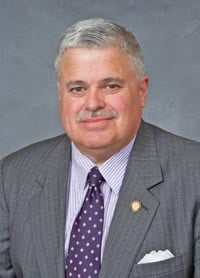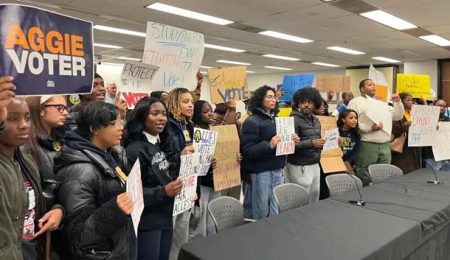The Long Session Casts a Long Shadow

Tom Apodaca
By Nelda Holder –
As an odd sort of grand finale to this long state legislative year, a number of current Republican legislators have announced that they will not file for re-election in 2016, among them Sen. Tom Apodaca, serving Henderson County and a portion of Buncombe County.
Recognized as one of the NC Senate’s most powerful members and currently chairman of the Rules Committee, Apodaca is in his seventh two-year term at the Statehouse in Raleigh. His exit, according to reports, is premised on his judgment that the Republican agenda that arrived with majorities in the House and Senate five years ago has basically been achieved.
Some 17 other Republican lawmakers also plan to head home for good after the short legislative session in 2016, including Sen. Bob Rucho of Matthews, who has served even longer than Apodaca and whose hand was considered on the steering wheel of both tax policy and voting district changes in the state (he chaired the Senate Redistricting Committee).
But at the end of the 2015 session, one of the longest sessions in over a decade (January 14 to September 30), lawsuits were still pending on a number of major issues bequeathed by the Legislature, from the new Voting Rights Act of 2014 all the way back to those redistricting maps drawn after the 2010 Census.
And repercussions from some of the more controversial changes undertaken during 2015 are likely to be around after these legislators make their exits next year.
Education
One of the more prominent issues in wrangling the state budget to passage continued to be education funding. After extensive controversy, the Legislature finally approved a budget allowing the state’s schools to continue using teaching assistants in the classrooms. Classroom teachers saw a $750 one-time bonus for the work they do, with no salary increase; starting teachers, however, got a bump up to $35,000 a year. In April the National Education Association calculated average teacher salary in the nation at $57,379; for North Carolina teachers, it was $47,783 — basically 17%, or $10,000, lower.
Voting Rights
In an apparent attempt to ameliorate the strict Voter ID bill enacted in 2013 (and now in court), the Legislature in 2015 relaxed the photo ID requirement to allow voters without a valid form of ID to cast a provisional ballot in one of two ways.
(1) Voters unable to obtain an acceptable photo ID due to a reasonable impediment (such as transportation problems, disability, work schedule) may sign a declaration describing the impediment and provide birth date and the last four digits of their Social Security number (or present their current voter registration card or a copy of an acceptable document with their name and address). Under this provision, the provisional ballot vote will be counted.
(2) Voters who have a photo ID but did not bring it to the polls may ask to vote a provisional ballot, but in order for their vote to be counted they must present their photo ID at the county board of elections office before noon on the day before canvass.
Environment
The most sweeping bill in 2015 affecting environmental regulation in the state was the rambling, 61-page HB 765, which was cited by Clean Water for North Carolina or its detrimental effect on water and air quality (privatized inspection and permitting), the risk of groundwater pollution (expansion of NC’s “risk-based remediation program”), legal fee conundrum (subjecting attorneys representing environmental, civic, and community organizations to fees if they lose against the state); and reduction of air quality monitoring. Additionally, the bill authorizes voluntary internal environmental audits and limited immunity for self-reporting violations.
Judicial Elections
The 2015 session saw the end of a popular program of public funding for judicial elections, and returned the Court of Appeals to partisan balloting from nonpartisan — despite an appeal from 14 of the 15 judges on that bench.
Historic Artifacts
Through an amendment attached to a flag protocol bill, the Legislature passed a protection clause or monuments and memorials “commemorating events, persons, and military service in North Carolina history,” taking away the power of municipalities or counties to permanently remove “objects of remembrance” located on public property within their boundaries. Another venture into visible state control over local entities, the bill drew this comment from Rep. George Cleveland (R) of Jacksonville: “Municipalities and cities are subdivisions of the state, and the state can play with their property if they feel like it.”
Immigration Policy
Late in the session, the Legislature passed HB 318 (see “One Law, Many Consequences” in the November 12 edition of Urban News) that placed new restrictions regarding legal identification for immigrants, ruling out the use of consular documents and certain locally approved identification cards. The bill also ruled out “sanctuary city” status for local governments in the state.
Read Nelda Holder’s blog, www.politicallypurplenc.com







